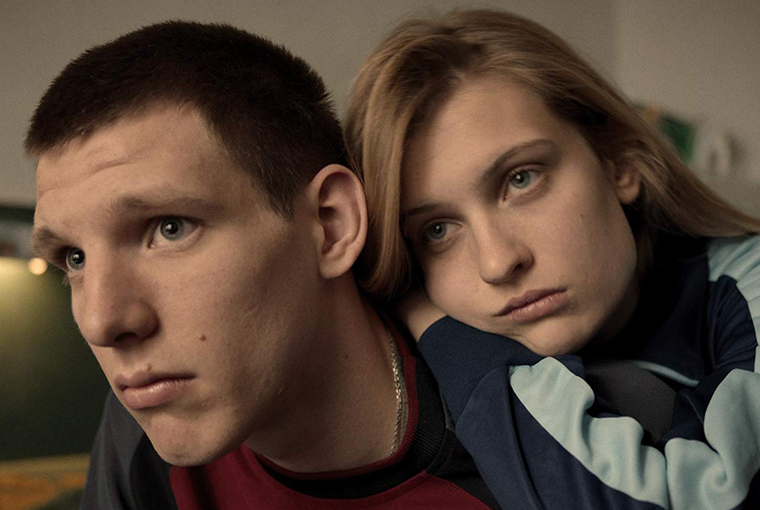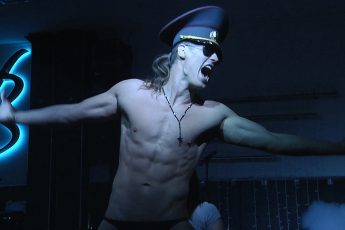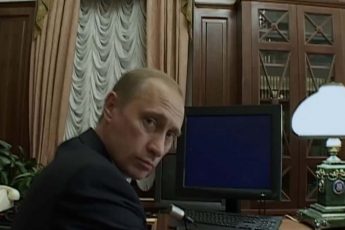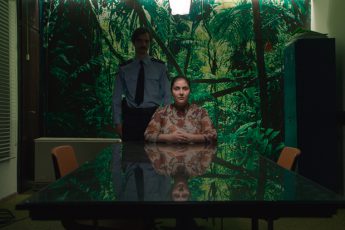
Rejected by society, vagabonds Bianka and Laci embark on a road trip with the promise of starting a normal life as a nuclear family by whatever means necessary. Day to day their happiness teeters on a razor’s edge as they flee from the law, debt collectors and eventually each other. Their reckless stupidity soon catches up with them as the consequences of stealing a baby and living independently from a community are realized in the harshest of ways. In László Csuja’s audacious and ambitious debut, two young people attempt the impossible by trying to outrun their own adolescent responsibilities.
The relationship between Bianka and Laci is intentionally dubious. During Laci’s psychological evaluation his guardian is informed that he cannot make decisions for himself. Bianka appears to lead Laci into her series of misdemeanors, giving him orders and instructions to seek better employment and a nicer living space for her and the baby. She emotionally manipulates those around her to get what she desires, to the point Laci goes out and steals a caravan to placate her. Their bond lacks any real romantic gestures, carefully avoiding any scenes of sexual consummation. They do share a certain level of intimacy that stems from their newfound parenthood duties where they change the baby’s nappy with an almost businesslike approach. Their platonic partnership is also repeatedly called into question as a result of Bianka’s general coquettishness and Laci’s yearning gazes at her. By the end of the film it is clear that neither care for one another enough to continue their difficult journey together and perhaps they never really did to begin with.
The complex role of Bianka is performed by the deservedly assured Bianka Berényi, who balances a youthful innocence and an insidious malevolence throughout the film. At times she is a harmless adolescent, frolicking in the park, dancing and singing karaoke with an explosive energy. Her pleasures are short-lived and shallow but she is truly passionate about them. Whether it’s sloppily sharing her ice cream with a dog or chasing chickens, her base, animalistic tendencies are innocuous and disarming. The darker side of Bianka is revealed early on when her character is first introduced. Splashing around in a stranger’s pool without permission, she unashamedly exits half naked to the shock of the surrounding neighbors. She knowingly steals a baby and its unattended pram from its mother, lying about its origin at every encounter to other strangers in the hope they will take pity on them. At the dance hall, Bianka spends her time flirting and joking with the other customers as her devoted Laci (László Réti) pleads ignorance. When debt collectors force Laci out of the caravan and begin to beat him, Bianka’s unpredictability does save his life as she shoots the offenders who then flee the scene. This bittersweet moment is exemplary of both her magnetism to risk and her (somewhat hazardous) capacity for compassion.
The fluid style of cinematography matches the meandering nature of the film’s protagonists. The slow, sinuous directions the camera takes when it pulls itself away from a tracking shot appear unpremeditated and random. This wandering frame is oftentimes unaligned and in constant motion as if agitated and impatient of following a single actor. A similar relationship is mirrored in Bianka and Laci where she attempts to lose him in the woods or at a party, bored of their misadventures. As well as their fleeting attention span, the camerawork also perfectly embodies their feeling of entrapment and isolation. The characters are shot from the edges of the frame as if being pushed aside and marginalized by both the camera’s lens and the society it captures.
The long takes and dynamic use of lighting obscure the natural beauty of the Hungarian countryside to produce an overwhelmingly volatile aesthetic. Even the wide open pastures seem unsafe and melancholic where the protagonist’s minuscule figure is lost in a sea of green, alone and abandoned, swallowed up by the sublime. The allure of the setting is persistently undermined by this atmospheric dread. What was meant to represent escape and protection for the unlikely couple is in fact just another background in which they seem destined to fail.
Additionally, the use of soft focus produces an image as amateurish and underdeveloped as the morals and perspicacity of Bianka and Laci. The spectator is offered a figurative point of view where it is impossible to see the bigger picture. Their future that lies just ahead of them in every establishing shot is unclear. It gives the impression that they are living in the present but they are also stuck there. This visual style illustrates perhaps why Bianka and Laci are so fixated on the immediate consequences rather than any long-term repercussions: they literally can’t see that far ahead.
Ultimately, Blossom Valley succeeds in defying typical genre expectations. Bianka and Laci aren’t simply trying to find their place in the world but test its boundaries, push its limitations and refuse to settle for anything less than they think they deserve. They don’t so much as follow a path but rather leave a destructive trail behind them in their wake. Bianka is selfish, self-gratifying and takes the utmost advantage of her mentally challenged companion until she becomes bored and leaves Laci and the baby to fend for themselves. Yet it is her unyielding autonomy that strikes a chord with the viewer. Bianka is undoubtedly a force to be reckoned with and her sensibilities as a provider and protector are what permit the audience to sympathize with the character. It is fair to say Csuja offers an engaging narrative with unexpected delights and a sobering conclusion for its well-developed characters that asks itself the most terrifying question of all: where do we go now?




Leave a Comment